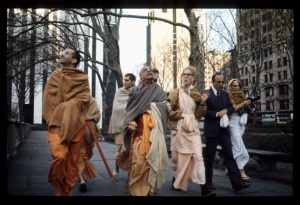CC Madhya 19.210 (1975): Difference between revisions
(Vanibot #0027: CCMirror - Mirror CC's 1996 edition to form a basis for 1975) |
(Vanibot #0020: VersionCompareLinker - added a link to the Version Compare feature) |
||
| Line 2: | Line 2: | ||
<div style="float:left">'''[[Sri Caitanya-caritamrta (1975)|Śrī Caitanya-caritāmṛta (1975)]] - [[CC Madhya (1975)|Madhya-līlā]] - [[CC Madhya 19 (1975)|Chapter 19: Lord Śrī Caitanya Mahāprabhu Instructs Śrīla Rūpa Gosvāmī]]'''</div> | <div style="float:left">'''[[Sri Caitanya-caritamrta (1975)|Śrī Caitanya-caritāmṛta (1975)]] - [[CC Madhya (1975)|Madhya-līlā]] - [[CC Madhya 19 (1975)|Chapter 19: Lord Śrī Caitanya Mahāprabhu Instructs Śrīla Rūpa Gosvāmī]]'''</div> | ||
<div style="float:right">[[File:Go-previous.png|link=CC Madhya 19.207-209 (1975)|Madhya-līlā 19.207-209]] '''[[CC Madhya 19.207-209 (1975)|Madhya-līlā 19.207-209]] - [[CC Madhya 19.211 (1975)|Madhya-līlā 19.211]]''' [[File:Go-next.png|link=CC Madhya 19.211 (1975)|Madhya-līlā 19.211]]</div> | <div style="float:right">[[File:Go-previous.png|link=CC Madhya 19.207-209 (1975)|Madhya-līlā 19.207-209]] '''[[CC Madhya 19.207-209 (1975)|Madhya-līlā 19.207-209]] - [[CC Madhya 19.211 (1975)|Madhya-līlā 19.211]]''' [[File:Go-next.png|link=CC Madhya 19.211 (1975)|Madhya-līlā 19.211]]</div> | ||
{{CompareVersions|CC|Madhya 19.210|CC 1975|CC 1996}} | |||
{{RandomImage}} | {{RandomImage}} | ||
==== TEXT 210 ==== | ==== TEXT 210 ==== | ||
| Line 11: | Line 10: | ||
<div class="verse"> | <div class="verse"> | ||
:pati-sutānvaya-bhrātṛ-bāndhavān | :pati-sutānvaya-bhrātṛ-bāndhavān | ||
:ativilaṅghya te | :ativilaṅghya te 'nty acyutāgatāḥ | ||
: | :gatividas tavodgīta-mohitāḥ | ||
:kitava yoṣitaḥ kas tyajen niśi | :kitava yoṣitaḥ kas tyajen niśi | ||
</div> | </div> | ||
| Line 27: | Line 26: | ||
<div class="translation"> | <div class="translation"> | ||
" 'Dear Kṛṣṇa, neglecting the order of our husbands and sons, family, brothers and friends and leaving their company, we gopīs have come to You. You know everything about our desires. We have only come because we are attracted by Your supremely musical flute. However, You are a great cheater. Who else would give up the company of young girls like us in the dead of night?' | |||
</div> | </div> | ||
| Line 34: | Line 33: | ||
<div class="purport"> | <div class="purport"> | ||
This verse, quoted from Śrīmad-Bhāgavatam ([[SB 10.31.16]]), describes how the gopīs | This verse, quoted from Śrīmad-Bhāgavatam ([[SB 10.31.16|10.31.16]]), describes how the gopīs exposed themselves for Kṛṣṇa's enjoyment in the dead of night. The gopīs approached Kṛṣṇa to enjoy themselves with Him in the rāsa dance. Kṛṣṇa knew this very well, but He was superficially trying to avoid them. He is therefore addressed by the gopīs as kitava, a great cheater, because He first attracted them to come dance with Him, and yet when they actually came, neglecting the orders of their friends and relatives, He tried to avoid them by giving them good instructions. These cunning instructions were too much for the gopīs to tolerate; they therefore had a right to address Kṛṣṇa as kitava, a great cheater. They were all young girls, and they had come to Him to be enjoyed. How could He avoid them? The gopīs therefore expressed great disappointment in this verse. They came voluntarily, but Kṛṣṇa was so cunning that He wanted to avoid their company. The gopīs' lamentation was certainly very appropriate, and in this way Kṛṣṇa tested their sincerity. | ||
</div> | </div> | ||
Latest revision as of 11:57, 27 January 2020

A.C. Bhaktivedanta Swami Prabhupada
TEXT 210
- pati-sutānvaya-bhrātṛ-bāndhavān
- ativilaṅghya te 'nty acyutāgatāḥ
- gatividas tavodgīta-mohitāḥ
- kitava yoṣitaḥ kas tyajen niśi
SYNONYMS
pati—husbands; suta—sons; anvaya—family; bhrātṛ—brothers; bāndhavān—friends; ativilaṅghya—without caring for; te—Your; anti—dear shelter; acyuta—O infallible one; āgatāḥ—have come; gati-vidaḥ—who know everything of our activities; tava—of You; udgīta—by the singing flute; mohitāḥ—being attracted; kitava—O great cheater; yoṣitaḥ—beautiful women; kaḥ—who; tyajet—would give up; niśi—in the dead of night.
TRANSLATION
" 'Dear Kṛṣṇa, neglecting the order of our husbands and sons, family, brothers and friends and leaving their company, we gopīs have come to You. You know everything about our desires. We have only come because we are attracted by Your supremely musical flute. However, You are a great cheater. Who else would give up the company of young girls like us in the dead of night?'
PURPORT
This verse, quoted from Śrīmad-Bhāgavatam (10.31.16), describes how the gopīs exposed themselves for Kṛṣṇa's enjoyment in the dead of night. The gopīs approached Kṛṣṇa to enjoy themselves with Him in the rāsa dance. Kṛṣṇa knew this very well, but He was superficially trying to avoid them. He is therefore addressed by the gopīs as kitava, a great cheater, because He first attracted them to come dance with Him, and yet when they actually came, neglecting the orders of their friends and relatives, He tried to avoid them by giving them good instructions. These cunning instructions were too much for the gopīs to tolerate; they therefore had a right to address Kṛṣṇa as kitava, a great cheater. They were all young girls, and they had come to Him to be enjoyed. How could He avoid them? The gopīs therefore expressed great disappointment in this verse. They came voluntarily, but Kṛṣṇa was so cunning that He wanted to avoid their company. The gopīs' lamentation was certainly very appropriate, and in this way Kṛṣṇa tested their sincerity.